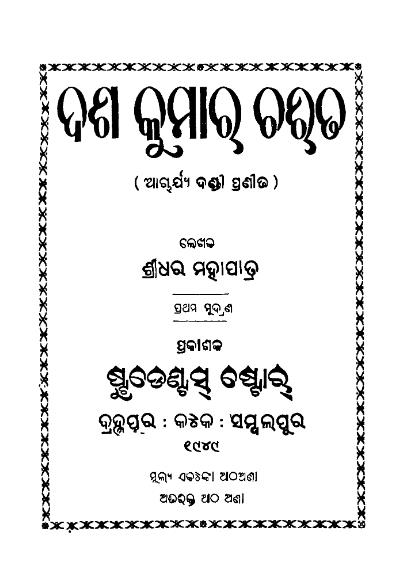In the rich tapestry of Odia literature, certain stories endure through generations, captivating readers with their profound themes and cultural significance. One such gem is Dasha Kumara Charita, a classic narrative penned by Acharya Dandi and Sridhara Mahapatra, published in 1949. This work, whose title translates to The Ten Sons, weaves together folklore and moral lessons, offering both entertainment and enlightenment.
At its core, Dasha Kumara Charita presents the tale of ten brothers, each embodying distinct virtues and attributes. The story unfolds as a reflection of familial bonds, ethical confrontations, and the trials faced by individuals in their journey toward personal growth and maturity. Through the experiences of the ten sons, the authors explore various facets of life, including courage, wisdom, sacrifice, and the essence of dharma (righteousness).
The narrative structure of Dasha Kumara Charita is engaging, unfolding through a series of episodes that highlight the adventures and challenges encountered by the brothers. Each son represents different values and character traits, allowing the reader to see the complexities of human behavior and the moral dilemmas faced in everyday life. This multidimensional portrayal not only enhances the richness of the narrative but also provides valuable lessons that resonate with readers of all ages.
A notable aspect of the storytelling in Dasha Kumara Charita is its incorporation of folklore and traditional motifs. Acharya Dandi and Sridhara Mahapatra expertly blend cultural elements with universal themes, grounding their story in the rich heritage of Odisha while making it relatable to a broader audience. The vivid descriptions of rural life, the vibrant portrayal of family dynamics, and the moral lessons embedded in the plot create a captivating narrative that draws readers in.
The characters in Dasha Kumara Charita are crafted with depth, allowing readers to form connections with them. Their struggles and triumphs reflect the challenges faced by individuals in society, emphasizing the importance of virtues such as integrity and compassion. As the story unfolds, the reader bears witness to the growth of each character, culminating in moments of self-discovery and resolution that leave a lasting impact.
Moreover, Dasha Kumara Charita serves as a reminder of the significance of cultural heritage in storytelling. By intertwining local folklore with moral teachings, the authors create a narrative that not only entertains but also educates. This book stands as a beacon of Odia literature, preserving traditional values while adapting them for contemporary readers.
The legacy of Dasha Kumara Charita extends beyond its pages, influencing subsequent generations of writers and storytellers. Its themes of family, virtue, and personal growth are timeless, appealing to the innate human desire for connection and understanding. The book encourages readers to reflect on their own values and the importance of nurturing relationships within their families and communities.
Books Info
| Books name | Dasha Kumara Charita / ଦଶ କୁମାର ଚରିତ |
| Author | Acharya Dandi; Sridhara Mahapatra, |
| No Of pages | 211 |
| Publisher | Sridhara Mahapatra |
| Publication | 1949 |
| Printed At | Students Store |
| Distributor | NA |

